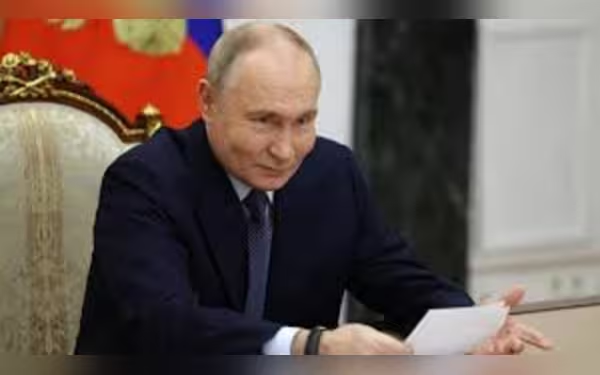Monday, November 25, 2024 07:29 AM
Russia's Hypersonic Missile Strike: A Warning to the West
- Russia launches hypersonic missile as a warning to the West.
- Kremlin labels Western support for Ukraine as reckless.
- Zelenskiy condemns Russia's actions as severe escalation.
 Image Credits: thefrontierpost
Image Credits: thefrontierpostRussia's hypersonic missile strike on Ukraine serves as a warning to the West amid escalating tensions.
The ongoing conflict between Russia and Ukraine has escalated significantly, particularly with the recent developments surrounding hypersonic missile technology. On Friday, the Kremlin made a bold statement regarding its military actions, asserting that a strike on Ukraine using a newly developed hypersonic ballistic missile was a direct warning to the West. This missile, known as the Oreshnik or Hazel Tree, was launched at a Ukrainian military facility, marking a pivotal moment in the ongoing war.
Kremlin spokesman Dmitry Peskov emphasized that this military action was a response to what he termed the "reckless" decisions made by Western countries. He pointed out that the West's support for Ukraine, including the supply of missiles, could not go unanswered. Peskov stated, "The main message is that the reckless decisions and actions of Western countries that produce missiles, supply them to Ukraine, and subsequently participate in strikes on Russian territory cannot remain without a reaction from the Russian side." This statement underscores the heightened tensions and the potential for further military confrontations.
President Vladimir Putin also weighed in, indicating that the missile strike was a reaction to Ukraine's recent use of U.S.-made and British-made missiles against Russian territory. He claimed that the missile and defense enterprise in Dnipro, Ukraine, was targeted due to its involvement in missile production. The Russian Defense Ministry reported that all warheads from the hypersonic missile successfully hit their intended targets, marking what they described as the first successful combat use of this advanced weaponry.
Ukrainian President Volodymyr Zelenskiy responded to these developments by labeling Russia's actions as a "clear and severe escalation." He called for a strong international condemnation of Russia's missile strike, highlighting the global implications of this conflict. Peskov, however, defended Russia's actions, stating that they had no technical obligation to inform the United States about the missile strike, as it was classified as an intermediate-range missile. Nevertheless, he mentioned that Moscow had notified the U.S. 30 minutes prior to the launch.
Putin's remarks also suggested a willingness to engage in dialogue, despite the ongoing hostilities. He criticized the outgoing Biden administration for its approach, suggesting that it preferred to escalate tensions rather than seek peaceful resolutions. The Russian leader had previously warned that allowing Ukraine to strike Russian territory with Western-made long-range missiles would fundamentally change the nature of the conflict, compelling Russia to take "appropriate decisions" in response to new threats.
As the situation continues to unfold, it is clear that the stakes are higher than ever. The use of hypersonic missiles represents a significant advancement in military technology, and the implications of such actions could reverberate far beyond the borders of Ukraine and Russia. The international community must remain vigilant and engaged, as the potential for escalation remains a pressing concern. Understanding the motivations and actions of both sides is crucial in navigating this complex geopolitical landscape, and it is imperative that dialogue and diplomacy are prioritized to prevent further conflict.













